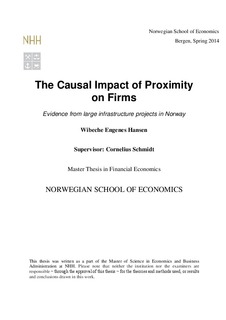The causal impact og proximity on firms : evidence from large infrastucture projects in Norway
Master thesis
Permanent lenke
http://hdl.handle.net/11250/223287Utgivelsesdato
2014Metadata
Vis full innførselSamlinger
- Master Thesis [4372]
Sammendrag
The objective of this thesis is to uncover the main motivations for, and hindrances against, student volunteer work, and to understand what it is that gives satisfaction from participation for the students.
In order to solve the objective, analyses are performed on collected data from students at NHH in Norway and at Tecnológico de Monterrey in Mexico. The analyses show connections between control variables and ten different motivational factors and five different hindrance factors, as well as connections between these factors and twelve factors for satisfaction. Analyses are also performed to assess the relationships between these factors and specific group memberships. In addition, the thesis discusses the respondents’ qualitative impressions of volunteers’ career advantages, and if their organization is optimally organized to facilitate volunteering.
These analyses show us some clear motivational differences, depending on the composition of the different response sets and responses to the control variables. We find a stronger motivation to participate for students who are not local, and who have a small network in the city. Motivation is also higher for students who have previously volunteered, and who have a high network in school. Hindrance to participate is found to be higher for those students who have other obligations in the form of jobs, other positions, or more family and friends. These hindrances are generally higher for local students. Satisfaction is higher for those students motivated by social network, interests, and experience, and among those in leadership positions.
We can also conclude that motivation, hindrance, group memberships and satisfaction are strongly connected. It seems that motivation to a degree decides what kind of group the students want to join, and that this again is important for the students’ satisfaction.
